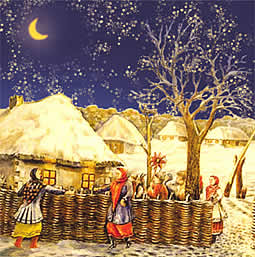IRVING BERLINIRVING BERLIN - I bet you thought he was German, didn’t you?
I just wanted to share some info on my favorite Russian composer and it seemed like the right time of year since he won an Academy Award in 1942 for “White Christmas”.
Irvin Berlin also composed “God Bless America” and here is the rest of the story...Nationality: Russian.
Source: Contemporary Authors Online, Gale, 2002.
Entry Updated : 02/25/2002
The most prolific of all American composers, Irving Berlin created over one thousand songs, nineteen stage scores, and eighteen film scores.
Called "the last of the troubadours" because of his simple melodies and warmhearted lyrics, Berlin forged his long and successful composing career from a musical style that was largely patriotic and sentimental.
"If some of [my] songs are corny," the artist once explained to Abel Green of Variety, "then it's because they're simple, and all I know is that some of the corniest and simplest songs have lasted."
Berlin began his musical career at age eight when his father died and the lad took to the streets to help support his family.
One of his first jobs was that of guide to Blind Sol, a singing beggar in New York City's Bowery.
From there, Berlin began to sing at popular cafes in the neighborhood, waiting on tables and learning to pick out tunes on the piano.
In 1907 the composer published his first song, "Marie From Sunny Italy," with Nick Nicholson, a pianist at the cafe.
Berlin also altered his name at that time.
In 1909 Berlin's attempts as lyricist captured the attention of music publisher Ted Snyder, who hired the young composer for twenty-five dollars a week.
While in Snyder's employ, Berlin continued to write his own songs, and in 1911 "Alexander's Ragtime Band" was published and made him an international celebrity.
By popularizing ragtime and its accompanying dance style, Berlin was one of the first American artists to showcase jazz and make it acceptable.
Within the next few years, the composer created a number of other "rags" and came to be identified in the public mind with all things ragtime.
Berlin was also a successful performer in vaudeville before World War I, first appearing on Broadway in "Up and Down Broadway" in 1910.
The artist introduced many of his own compositions on the stage, but Berlin was generally more interested in writing music than in performing it.
He contributed songs to many Broadway musicals, including the unofficial theme for all the Ziegfeld spectacles, "A Pretty Girl Is Like a Melody."
In 1914 he wrote his first complete musical score, Watch Your Step.
With the onset of World War I, Berlin was drafted into the army, where he used his musical abilities to raise money for a service center at Camp Upton.
The composer's "Yip Yip Yaphank," an all-soldier show, raised over $150,000 from its Broadway run in 1918.
After the war, Berlin returned to New York City and formed the Irving Berlin Music Company, a music publishing firm.
Shortly thereafter, the composer erected the Music Box Theatre in 1921 in New York City and used it for several years to showcase his musical creations.
Yet by 1934, the West Coast and its movie industry had begun to attract the Broadway veteran, who wrote the film score for Top Hat,starring Fred Astaire and Ginger Rogers.
Berlin also contributed individual songs to numerous movies, including Puttin' on the Ritz and Sayonara.
At the beginning of World War II, Berlin's sense of patriotism prompted him to create another all-soldier show, "This Is the Army," which raised $10 million for the Army Emergency Relief fund.
Before that, in 1939, Berlin's patriotic and philanthropic inclinations had moved him to allocate all royalties from his popular "God Bless America" to the Boy Scouts and Girl Scouts of America.
In addition, Berlin composed songs for the Army Ordnance Department ("Arms for the Love of America") and the Treasury Department ("Any Bonds Today?"), with profits going to each bureau.
In 1954 Berlin attempted to retire, but returned to Broadway in 1962 with a final stage score, "Mr. President."
After the show's long run, the composer re-retired to his home in upstate New York, where he golfed, fished, painted, and, as he told Newsweek, "tinker[ed] at the piano" until his death in 1989.
Among his career honors are an Academy Award, a Tony, and a Congressional Gold Medal of Honor.
PERSONAL INFORMATIONFamily: Birth-given name, Israel Baline;
born May 11, 1888, in Temum, Russia;
came to the United States, 1893, naturalized citizen;
died September 22, 1989, in New York, NY;
son of Moses (a cantor and shochet [meat/poultry certifier]) and Leah (Lipkin) Baline;
married Dorothy Goetz, February, 1913 (died July 17, 1913);
married Ellin Mackay, January 4, 1926;
children: Mary Ellin (Mrs. Marvin Barrett), Linda (Mrs. Edouard Emmet), Elizabeth (Mrs. Alton Peters).
Education: Attended New York City public schools.
Military/Wartime Service: U.S. Army, Infantry, 1917-18; became sergeant.
Memberships: American Society of Composers, Authors and Publishers (charter member; director, 1914-18), Masons (Shriners), Elk, Lambs, Friars, City Athletic Club.
AWARDSAcademy Award for best song from Academy of Motion Picture Arts and Sciences, 1942, for "White Christmas;" Medal of Merit, 1945, for "This Is the Army"; Congressional Gold Medal of Honor, February 11, 1955, "in recognition of his services in composing many patriotic songs including `God Bless America'"; Antoinette Perry Award from League of New York Theatres and Producers, April, 1963, for "distinguished contribution to the musical theatre for many years." Awarded D.Mus. from Bucknell University, 1939, Legion of Honor (France), 1947, D.Mus. from Temple University, 1954, D.H. from Fordham University, 1969, and Medal of Freedom, 1977.
Posted by Lillyan at
11:19 AM Thursday, November 13, 2008






